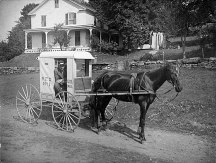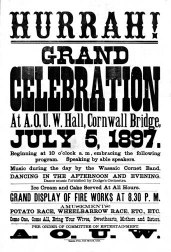January 5, 2001
A Visual Reminiscence 1868-1941
The Cornwall Historical Society announces publication of Cornwall in Pictures—A Visual Reminiscence 1868-1941, with text by Jeremy Brecher, life-long Cornwall resident and Connecticut historian. Published by the Cornwall Historical Society, the book, with a hard-cover cloth binding and 224 pages, contains more than 400 images, mostly photographs from the Cornwall Historical Society’s extensive collection.
Cornwall in Pictures was made possible, in part, by a grant from the Connecticut Humanities Council and through the generosity of private donors. The book will be for sale at $25.
The volume’s period begins with the town’s earliest known photographic images, from right after the Civil War. It ends on the eve of World War II, which changed Cornwall –and the nation–so profoundly. Cornwall’s beginnings were a story of harsh winters and brute labor. The first settlers preferred the hills because the timber was easier to clear for cultivation and pasture than the densely wooded valleys. Though Cornwall was to grow and prosper, with its share of advances in agriculture and industry, this gritty quality underlay people’s lives, as it did in innumerable rural American towns, until fairly recent times. After the bitter hardship of the early years, a certain roughness continued to qualify the substantial joys and rewards of life in Cornwall.
 This is certainly the impression conveyed by the extensive (2,000 images) collection of photographs held by the Cornwall Historical Society. In this revealing volume, the Society has assembled some of the best of these photographs—and others– from a transitional era of dirt roads, horses and oxen—and a few cars and trucks. Looking at some of these pictures, one can readily imagine what life was like 50 or 75 years before the photograph was taken. The late Harriet L. Clark made the point eloquently:
This is certainly the impression conveyed by the extensive (2,000 images) collection of photographs held by the Cornwall Historical Society. In this revealing volume, the Society has assembled some of the best of these photographs—and others– from a transitional era of dirt roads, horses and oxen—and a few cars and trucks. Looking at some of these pictures, one can readily imagine what life was like 50 or 75 years before the photograph was taken. The late Harriet L. Clark made the point eloquently:
“I am going to try to persuade you to consider the 50 years from 1860 to 1910 as a peak in our life. The invention of cameras made photographs more common in the 1880s and after. So with pictures and more printed material, we know much more of this period than we can know of the earliest years of our town.”
 Cornwall is a town of many settlements. The book is organized around these varied centers—notably the familiar West Cornwall and Cornwall Bridge, but also East Cornwall and Cornwall Hollow, among lesser-known neighborhoods. Most of the people pictured in the book were and are unknown beyond Cornwall’s limits —though hundreds are identified in the captions; but Cornwall Hollow was home to the town’s Civil War hero, Major General John Sedgwick, killed by a sharpshooter at the Battle of Spotsylvania in 1864.
Cornwall is a town of many settlements. The book is organized around these varied centers—notably the familiar West Cornwall and Cornwall Bridge, but also East Cornwall and Cornwall Hollow, among lesser-known neighborhoods. Most of the people pictured in the book were and are unknown beyond Cornwall’s limits —though hundreds are identified in the captions; but Cornwall Hollow was home to the town’s Civil War hero, Major General John Sedgwick, killed by a sharpshooter at the Battle of Spotsylvania in 1864.
Cornwall in Pictures is not only images. In his introduction and in essays that lead off each chapter, Jeremy Brecher establishes the historic context for the pictures and limns the character of Cornwall’s many venues. He points out, for instance, that New England’s industrial revolution had its beginnings not in Connecticut’s larger cities but in the northwest corner, including Cornwall, where shear manufacturing and iron production were among the earliest and most persistent of industries.
Jeremy Brecher, a lifelong Cornwall resident, is a historian and the author of ten books, including Strike! Brass Valley; The Story of Working People’s Lives and Struggles in an American Industrial Region; History From Below: How to Uncover and Tell The Story of Your Community. Since 1989, Brecher has served as Humanities Scholar-in-Residence at Connecticut Public Television and Radio, a position supported by the Connecticut Humanities Council.
As of January 5, 2001, Cornwall in Pictures has sold out. The Cornwall Historical Society will reprint the volume, and it should be available about mid-March. To reserve your copy, call Charles Osborne, 860-672-6296, or write to Osborne c/o the Cornwall Historical Socciety, P.O. Box 115, Cornwall CT 06753.. Thanks very much. Charlie Osborne